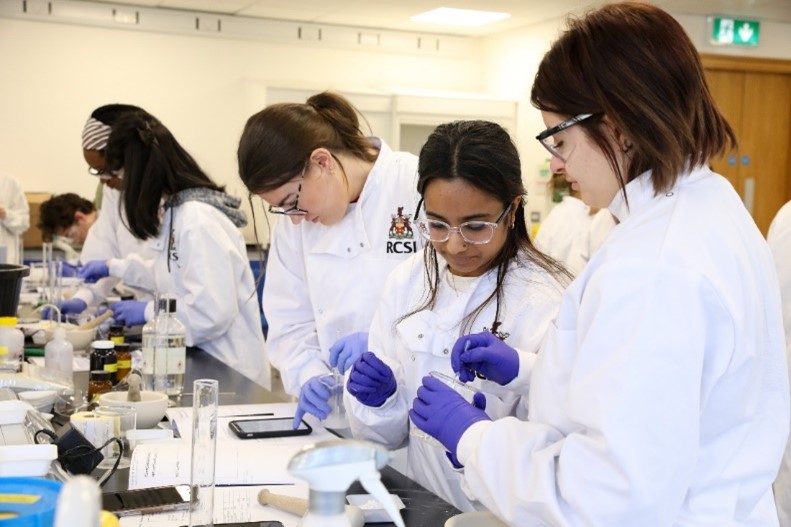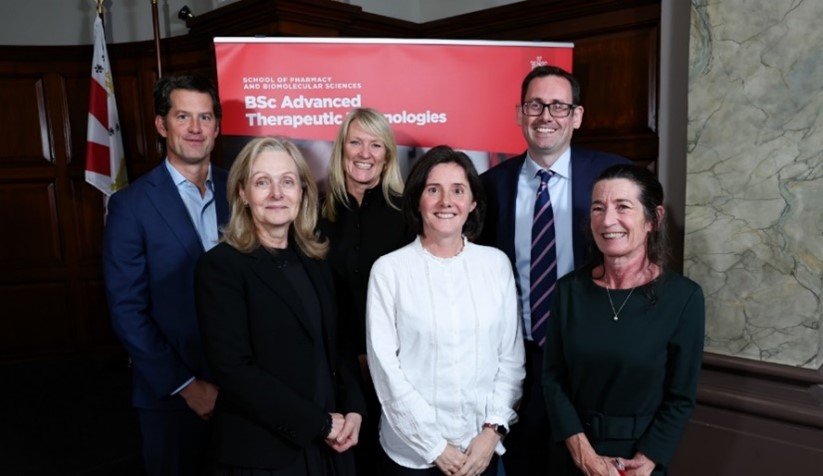
Project Team
Prof Tracy Robson, Project Lead
Provide a short description of the project
The programmes under the Enabling Future Pharma project have been specifically designed to meet the new needs driven by a major shift in the bio/pharmaceutical sector such as precision medicine, bioinformatics, immunotherapeutics, AI (Artificial Intelligence), and digital and connected health.
MSc Technologies and Analytics in Precision Medicine (TAPM)
The TAPM programme provides a flexible approach to upskilling in the areas of precision medicine, with students able to undertake either a full-time 1-year or a part-time 2-year MScTAPM. Minor qualifications including diploma, certificates and micro credentials are also offered, providing a range of opportunities for people at various stages of their career.
This programme offers the opportunity to gain a more in depth understanding of the emerging field of genomics, data analytics and computational biology and was designed with input from our External Advisory Board to ensure industry needs were met.
BSc Advanced Therapeutic Technologies (ATT)
The BScATT is a 4-year undergraduate programme whose curriculum is specifically designed to focus on industry relevant skills in emerging technologies to meet identified skill-needs for enterprise. The topics taught span from basic sciences, through to advanced therapeutics including precision medicine, regenerative medicine, advanced drug delivery, immunotherapeutics, data analytics and bioinformatics, AI & ML and connected/digital health. The programme seeks to act as a bridge between the therapeutic and computational sciences, with a particular focus being on the application of computational sciences in healthcare technologies. Transversal skills have been included as vertical pillars throughout all years of the programme, integrated into the design and assessment and personalized to the learner journey. A key component of the BScATT is the inclusion of an 8-month experiential industry learning placement in Y3 of the programme and transversal skills modules in the preceding years known as ‘Professional formation’ modules focus on building transversal skills prior to the placement.
Highlight interesting collaborations / partnerships
This programme is being delivered collaboratively with leading national and multinational bio pharma companies and other enterprise partners to address the evolving healthcare environment. Our collaborative partners to date include Congenica Ltd, Novartis, Microsoft, Aerogen, S3 Connected Health, Inflection Biosciences, Phion Therapeutics and Almac Sciences, Invisio Ltd, PWC, and Avadel Pharmaceuticals. The strong engagement by industry partners brings a true translational focus to the programmes that could not have been achieved without their input.

More specifically the collaborations with the partners include:
- All collaborative partners have provided valuable advice and input into the curriculum development of the MScTAPM and BScATT.
- Partners directly involved in teaching activities in the BScATT and MScTAPM include: S3Connected health and Data Sciences /AI hub, Novartis Ireland, Congenica Ltd, and Invisio Ltd.
- Two of our industrial partners participated in our RCSI Transition Year MiniPharm under the newly developed section for the ‘Enabling Future Pharma’ programme during 2022 MiniPharm and participated in successful RCSI Transition Year MiniScientist 2023.
- Our External Advisory Board (EAB) industry partners provide mentorship for the MScTAPM students and MScTAPM research projects.
- EAB members have supported marketing activities e.g., contributed to the project video created by HEA, programme brochures, event information etc.
- The BSc programme includes an eight-month Industry placement which the programme partner’s support.
Provide a brief summary of the project’s key enterprise engagements
Engagement with enterprise began at the time of grant preparation and this led to the establishment of our EAB, which includes representatives from both MNC e.g., Novartis and SME e.g., Aerogen, Inflection Biosciences. Our EAB has been central to providing support and insight in the development of our curricula for the MScTAPM and the BScATT to ensure our graduates are appropriately trained for industry.
Further engagement with enterprise has been in relation to building relationship and gain commitments for the 8-month experiential learning placements for the BSc students. Of particular interest has been the level of engagement from ‘non-traditional’ enterprise partners including consultancy firms such as KPMG and Mazars. We are eager to provide students with as broad a range of experiential learning opportunities as possible, and the skillset they will gain are applicable for a wide scope of activities.
For the MScTAPM we have received strong engagement from our EAB around both industry mentoring for students and providing research projects for students.
We have also received significant engagement and support from Takeda Ireland, with their general manager, Mr. Shane Ryan delivering a keynote at our BScATT launch event in October 2022. In addition, we have engaged with the IDA who are extremely interested in sharing details of our programmes with their clients. The BScATT programme director also attended an IDA skills event on the 19th of Oct 2022.
Of particular note has been the level of interest and enthusiasm from enterprise partners to contribute and participate in teaching activities within both the MScTAPM and BScATT programmes. This brings an opportunity to provide an ‘industry’ perspective and perspective on specialised areas for the ATT programme, as well as the opportunity to increase brand awareness for the companies.

Pictured from left:
Back: Mr Shane Ryan, General Manager, TAKEDA; Prof Tracy Robson, Head of School; Dr Ben Ryan, Director of BScATTATT programme
Front: Prof Laura Viani, President, RCSI; Prof Helena Kelly, Deputy Head of School, RCSI; Prof Judith Harmey, Associated Director of BScATT.
Project Showcase
BSc Open Day: The RCSI Undergraduate Open Day took place on-site on Wednesday, 4 January 2023. Attendees learned more about our programmes, admissions essentials, RCSI’s world-class facilities, student life, and the career supports available to RCSI students. Attendees also had the chance to participate in career-focused workshops related to both our Advanced Therapeutic Technologies programme as well as all other courses offered within RCSI (Medicine, Pharmacy, and Physiotherapy). https://www.rcsi.com/dublin/news-and-events/news/news-article/2023/01/students-explore-programmes-at-rcsi-open-day
BSc Launch Event: A launch event for the BScATT was held on the 4th October 2022. Invites were sent to all BScATT students, our industry partners and contacts as well as HEA and IDA. The Keynote speaker for the launch event was Dr Shane Ryan, General Manager, TAKEDA. The launch event was very successful with over 150 attendees.
RCSI project video: https://www.youtube.com/watch?v=9TVUYmh54nY
73 Questions: 73 Questions with an Advanced Therapeutic Technologies Student | RCSI – YouTube
TY MiniScience: Over 3,000 prospective students participated in our MiniScience Transition Year programme in March 2022, which had a full session covering the ‘Enabling Future Pharma’ BScATT. This successful programme was held again on 2nd March 2023.
Last updated: November 2024
